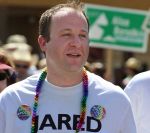 It was 61 years ago today that Alan Turing took his life. He was not able to see anyway out of the homophobic culture he had endured. The irony is not lost that just two years ago the British government finally declared that Turing would no longer be considered a criminal for being gay.
It was 61 years ago today that Alan Turing took his life. He was not able to see anyway out of the homophobic culture he had endured. The irony is not lost that just two years ago the British government finally declared that Turing would no longer be considered a criminal for being gay.
Alan Turing was born in 1912. His teachers and family noticed his immense talent for mathematics early on, and he began a rigorous education. He became a fellow at King’s College at the age of 22 and began work on computation. His pioneering work earned him the title: Father of Computer Science. During the war, he worked for the British government as a code breaker. His methods helped crack critical German codes. Some have gone so far as to give him credit for Britain making it through the war without surrender. Turing’s contributions to computer science, cryptology, artificial intelligence, and mathematics are immense, and his gracious style made his ideas approachable, helping spark further innovation.
He was also gay. He was generally careful about this fact, given that any homosexual activity was still criminal in the United Kingdom, but he did have partners. In 1952, after reporting a break-in at his home, he admitted to the police that he was in a gay relationship with the other man living there. He was arrested charged with “gross indecency.” While he felt no guilt about simply being who he was, he pleaded guilty to avoid the negative publicity of a trial. He opted for injections of artificial estrogen — chemical castration — rather than go to prison.
The conviction revoked his security clearance and ruined his career. It kept him from travelling to the United States to expand on his work. It left him alone and bitter, his promising life in ruins at the age of 40 just because he wanted to live his life honestly. In 1954, he died of a cyanide overdose that was ruled suicide. What a pointless end to an amazing life and we must ask ourselves who is culpable–who has blood on their hands? How do we learn from this tragedy and learn how to support our LGBT brothers and sisters?
While very well known in math and science circles, the scandal kept his work and life from greater renown. It wasn’t until 2009 that the British government — in a statement from Prime Minister Gordon Brown — apologized for what Brown aptly described as “appalling treatment.” (The Brits did better than the Catholic church, of course, with its habit of taking centuries to apologize for its legal abuses…) In the past four years, a bill has slowly worked through the parliamentary process to formally pardon Alan Turing. It appears poised to pass in October.
It will be wonderful for the charges against Turing to be formally erased. But his life cannot be returned. The amazing things his mind would have accomplished will never come to pass. The horrific impact of homophobia and abuse of power cannot be fully calculated or undone. Over 49,000 men were sentenced for the same crime in Britain — including Oscar Wilde — before the law was finally removed from the books.
There are still many countries with laws like this. There are still jurisdictions in our own country with laws like this. Let the dark example of Alan Turing be a call to action — every life deserves dignity, legalized oppression and discrimination must be stopped. In the end, Alan Turing was a victim, not a criminal. He does not need to be pardoned, the British government does, and this one positive step is simply not enough to wash the blood of thousands from its hands.










